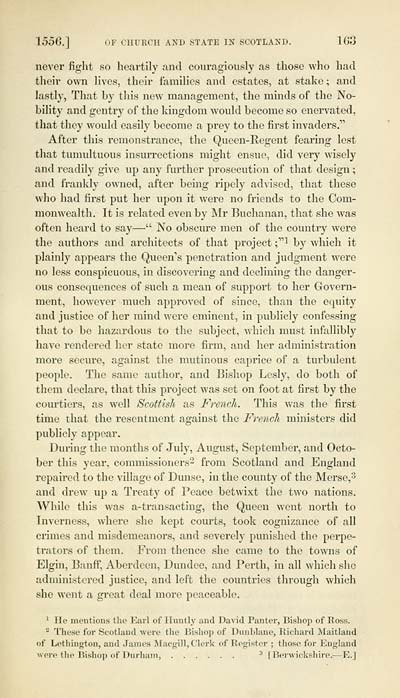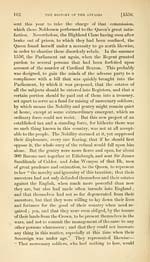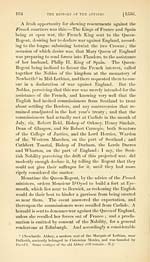Spottiswoode Society > History of the affairs of the Church and State of Scotland from the beginning of the reformation to the year 1568 > Volume 1
(299) Page 163
Download files
Complete book:
Individual page:
Thumbnail gallery: Grid view | List view

1556. | of church and state in Scotland. 163
never fight so heartily and couragiously as those who had
their own lives, their families and estates, at stake ; and
lastly, That by this new management, the minds of the No-
bility and gentry of the kingdom would become so enervated,
that they would easily become a prey to the first invaders."
After this remonstrance, the Queen-Kegent fearing lest
that tumultuous insurrections might ensue, did very wisely
and readily give up any further prosecution of that design ;
and frankly owned, after being ripely advised, that these
who had first put her upon it were no friends to the Com-
monwealth. It is related even by Mr Buchanan, that she was
often heard to say — " No obscure men of the country were
the authors and architects of that project j 1 ' 1 by which it
plainly appears the Queen's penetration and judgment were
no less conspicuous, in discovering and declining the danger-
ous consequences of such a mean of support to her Govern-
ment, however much approved of since, than the equity
and justice of her mind were eminent, in publicly confessing
that to be hazardous to the subject, which must infallibly
have rendered her state more firm, and her administration
more secure, against the mutinous caprice of a turbulent
people. The same author, and Bishop Lesly, do both of
them declare, that this project was set on foot at first by the
courtiers, as well Scottish as French. This was the first
time that the resentment against the French ministers did
publicly appear.
During the months of July, August, September, and Octo-
ber this year, commissioners 2 from Scotland and England
repaired to the village of Dunse, in the county of the Merse, 3
and drew up a Treaty of Peace betwixt the two nations.
While this was a-transacting, the Queen went north to
Inverness, where she kept courts, took cognizance of all
crimes and misdemeanors, and severely punished the perpe-
trators of them. From thence she came to the towns of
Elgin, Banff, Aberdeen, Dundee, and Perth, in all which she
administered justice, and left the countries through which
she went a great deal more peaceable.
1 He mentions the Earl of Huntly and David Panter, Bishop of Ross.
s These for Scotland were the Bishop of Dunblane, Richard Maitland
of Lethington, and James Macgill, Clerk of Register ; those for England
were the Bishop of Durham, 3 [Berwickshire. — E.j
never fight so heartily and couragiously as those who had
their own lives, their families and estates, at stake ; and
lastly, That by this new management, the minds of the No-
bility and gentry of the kingdom would become so enervated,
that they would easily become a prey to the first invaders."
After this remonstrance, the Queen-Kegent fearing lest
that tumultuous insurrections might ensue, did very wisely
and readily give up any further prosecution of that design ;
and frankly owned, after being ripely advised, that these
who had first put her upon it were no friends to the Com-
monwealth. It is related even by Mr Buchanan, that she was
often heard to say — " No obscure men of the country were
the authors and architects of that project j 1 ' 1 by which it
plainly appears the Queen's penetration and judgment were
no less conspicuous, in discovering and declining the danger-
ous consequences of such a mean of support to her Govern-
ment, however much approved of since, than the equity
and justice of her mind were eminent, in publicly confessing
that to be hazardous to the subject, which must infallibly
have rendered her state more firm, and her administration
more secure, against the mutinous caprice of a turbulent
people. The same author, and Bishop Lesly, do both of
them declare, that this project was set on foot at first by the
courtiers, as well Scottish as French. This was the first
time that the resentment against the French ministers did
publicly appear.
During the months of July, August, September, and Octo-
ber this year, commissioners 2 from Scotland and England
repaired to the village of Dunse, in the county of the Merse, 3
and drew up a Treaty of Peace betwixt the two nations.
While this was a-transacting, the Queen went north to
Inverness, where she kept courts, took cognizance of all
crimes and misdemeanors, and severely punished the perpe-
trators of them. From thence she came to the towns of
Elgin, Banff, Aberdeen, Dundee, and Perth, in all which she
administered justice, and left the countries through which
she went a great deal more peaceable.
1 He mentions the Earl of Huntly and David Panter, Bishop of Ross.
s These for Scotland were the Bishop of Dunblane, Richard Maitland
of Lethington, and James Macgill, Clerk of Register ; those for England
were the Bishop of Durham, 3 [Berwickshire. — E.j
Set display mode to: Large image | Transcription
Images and transcriptions on this page, including medium image downloads, may be used under the Creative Commons Attribution 4.0 International Licence unless otherwise stated. ![]()
| Permanent URL | https://digital.nls.uk/79600376 |
|---|
| Description | Volume I. |
|---|---|
| Attribution and copyright: |
|

